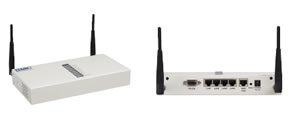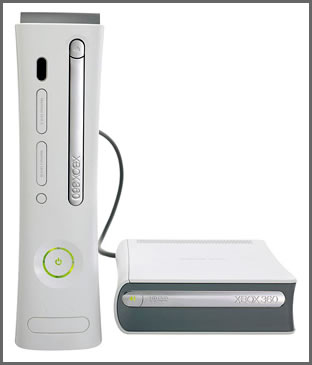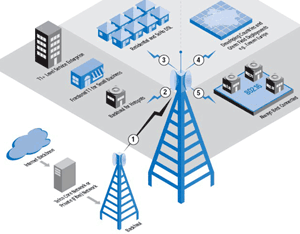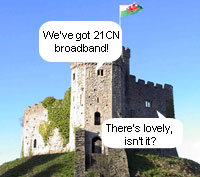 SMC have launched a business friendly Wi-Fi HotSpot in a box (SMCWHSG14-G).
SMC have launched a business friendly Wi-Fi HotSpot in a box (SMCWHSG14-G).
It’s designed to support up to 100 concurrent users and comes with a printer so Wi-Fi access codes and invoices can be issued simply.
(more…)
The new digital ways content was becoming distributed
 SMC have launched a business friendly Wi-Fi HotSpot in a box (SMCWHSG14-G).
SMC have launched a business friendly Wi-Fi HotSpot in a box (SMCWHSG14-G).
It’s designed to support up to 100 concurrent users and comes with a printer so Wi-Fi access codes and invoices can be issued simply.
(more…)
 Sony is adapting their idea of the PS3 online store, taking it to their handheld games machine, the PSP – in the US at least.
Sony is adapting their idea of the PS3 online store, taking it to their handheld games machine, the PSP – in the US at least.
It’s expected that a wide variety of content could be downloaded to it – demos, full games, possibly even music and videos.
With a planned start date of Autumn, or Fall for our US readers, access will be via the handheld’s Wi-Fi, using the Web browser that comes built-in.
It’s not exactly a lightening move, given that the UK release date of the PSP was September 2005 – and that was behind the US and Japan. This was acknowledged by Jack Tretton, Sony Computer Entertainment America president, “I think the advent of a long awaited and quite frankly long overdue ability to deliver a downloadable service for the PSP will help us out a great deal.”
 BT are rather pleased with themselves today as they’ve gained the number one position, as Britain’s most popular broadband retailer.
BT are rather pleased with themselves today as they’ve gained the number one position, as Britain’s most popular broadband retailer.
They now got 3.66m broadband customers which, in their words “leapfrogs” them over Virgin Media (NTL/ Telewest as was).
BT are of course running a reduced price scheme for the first six months of sign up – as are Virgin Media. The big difference between the two offers is the entry price – BT £8.95/month and VM £14.99. We would suggest that this has had a major impact in achieving BT’s current number one position (as well as buying PlusNet a short while back).
We’ve just a little, quick maths on the number of BT’s subscribers.
There’s healthy cash flows for BT in this game. Even taking the customers to be on the lowest package, they’ll be clawing in £66m _per month_. This rises to £91m if people are on the highest package.
On a yearly basis that’s broadband subscriptions earning for BT of between £792m and 1.092 Billion a year! Don’t forget you also _have_ to have a phone line with them to have their broadband, so extra earning there.
Not a bad little business broadband has turned out to be for them really. Makes you wonder why they were so reluctant to get going back in the late ’90’s/early 2000’s.
 Want a quick recap on how the growth in the access to broadband has gone in the UK?
Want a quick recap on how the growth in the access to broadband has gone in the UK?
Lucky for you Christopher Huhne, the Liberal Democrat MP for Eastleigh asked the DTI
how many and what proportion of homes had access to broadband in each year since 2000; what (a) estimates of and (b) targets for broadband access his Department has made for future years;
Which led Margaret Hodge to share the following
(more…)
 Rockers Nine Inch Nails have released three tracks from their new album, “Year Zero” via the controversial BitTorrent mega-site, The Pirate Bay.
Rockers Nine Inch Nails have released three tracks from their new album, “Year Zero” via the controversial BitTorrent mega-site, The Pirate Bay.
Although the band has already acquired a reputation for dishing out the freebies – new Nine Inch Nails (NiN) content has been available for free both online and on their website for some time – it’s the first time that they’ve released material directly via the torrent protocol.
(more…)
 Microsoft have actually made a sensible decision, an external HD DVD drive for the Xbox 360 and it works.
Microsoft have actually made a sensible decision, an external HD DVD drive for the Xbox 360 and it works.
With a recent software update the Xbox 360 was given HD support and suddenly 1080i and 1080p resolutions sprang to life (of course not all games support these new modes). Unfortunately the internal DVD is a bog standard DVD-ROM drive and it doesn’t support the new HD formats at all.
The external drive connects through one of the Xbox 360’s USB ports, it’s a shame there aren’t any rear sockets as the cable dangles out the front of the unit. Just plug it in, connect its power supply unit and install the software that comes with the unit and that’s it. It all just works. MS have been nice and included a DVD remote, though the normal game controllers work too.
Upscaled content
A nice feature is that the Xbox 360 will upscale content to whatever your output is set to (tested using 1080i), so a normal standard def DVD can be output at 1080i or 1080p. It works surprisingly well. There were very occasional artefacts or blocking – but it’s eminently viewable, even on a high action film (shame the film itself wasn’t). There are quite a few DVD players that offer some kind of upscaling feature, but it generally adds to the cost significantly.
Silence is golden
DO NOT EVER watch a film with quiet bits in it. The major downside to this set-up is that the Xbox 360 sounds like a train rumbling through your living room, it’s incredibly loud. As soon the the film quietens, there it is. You cant quite block it out.
Current Xbox 360’s also don’t support HDMI (the newly announced Elite will) so the best resolutions require component video and that means a separate audio output. The cable does have an optical out, but it doesn’t support newer digital modes like Dolby TruSurround.
Verdict
For around 130 quid, a bargain HD-DVD drive that upscales as well, but it’s bulky and noisy.
Features: 88%
Ease of Use: 90%
Value for Money: 97%
Overall Score: 81% (let down by Xbox 360 noise)
 The world’s top handset maker Nokia has announced that it expects to start shifting mobile devices using the WiMAX Internet technology by early 2008.
The world’s top handset maker Nokia has announced that it expects to start shifting mobile devices using the WiMAX Internet technology by early 2008.
WiMAX (or Worldwide Interoperability for Microwave Access if you’re a spoddy type) lets laptops, phones and other suitably equipped mobile devices access the Internet at Billy Whizz speeds.
The technology uses a licensed spectrum to offer long-range (we’re talking kms), point-to-point connections to the web from the service provider to the end user, with Nokia saying that they plan to bring their first WiMAX enabled mobile device to market in early 2008.
 Nokia’s numero uno handset rival, Motorola, has announced that it fancies a piece of the WiMAX action too, saying that they’ll also be bringing a WiMAX enabled mobile phone to market in 2008.
Nokia’s numero uno handset rival, Motorola, has announced that it fancies a piece of the WiMAX action too, saying that they’ll also be bringing a WiMAX enabled mobile phone to market in 2008.
Intel, Nokia, Samsung and Motorola are all feeling the love for the open-standard WiMAX. The technology can be used as an alternative wireless broadband Internet connection for 3G users, which is handy because net access on 3G mobile networks can slow right down if networks fill up with yakking voice callers.
WiMAX should considerably reduce the cost of wireless broadband – up to 10 times cheaper than current third-generation cellular telephony networks – but the technology isn’t apparently too hot for handling wireless voice calls.
WiMAX looks good when it comes to pricing: the radio spectrum for WiMAX networks is rented out at cheaper rates by regulators than the 3G mobile phone spectrum, and WiMAX equipment vendors reckon that infrastructure and handheld devices work out cheaper than 3G systems too.
The City of London is due to become the biggest Wi-Fi hotspot in Europe next week, as we trailed last year.
 A planned rollout will veritably bathe the City in luverly Wi-Fi rays, letting around 350,000 workers wander all over the Square Mile with uninterrupted wireless access.
A planned rollout will veritably bathe the City in luverly Wi-Fi rays, letting around 350,000 workers wander all over the Square Mile with uninterrupted wireless access.
The system comes courtesy of wireless network big boys, The Cloud, and dishes up continuous wireless access thanks to ‘mesh technology’ and a series of base stations strategically located throughout the area.
Although there’s something like 2,000 conventional Internet hotspots scattered around London, virtually all of these require users to keep on logging every time they walk into a new zone. The new City system means that users will only have to log in once and then be able to retain access at locations throughout the city.
“This is the biggest hotspot of its kind in Europe as far as we know and is unique as users keep the signal wherever they are,” enthused Niall Murphy, chief strategy officer at The Cloud.
 “We have been meeting a lot of the big financial institutions in the area and have even found that the network is available in a lot of their boardrooms, so we think there will be a corporate use for it as well,” he added.
“We have been meeting a lot of the big financial institutions in the area and have even found that the network is available in a lot of their boardrooms, so we think there will be a corporate use for it as well,” he added.
Perambulating freeloaders hoping to nab some free City-based Wi-Fi access action will be disappointed though. Unlike the mile long wireless freebie served in uptown Islington, users will have to shell out around £12 per month for unlimited access – quite a drop from the £5/hour they spoke about in February last year.
With its infrastructure able to support secure public and private applications concurrently, The Cloud are targeting consumers and municipal workers, although there’s also support for telemetry, traffic surveillance and security systems.
The Cloud say that they plan to extend coverage into Soho and eventually extend the infrastructure across all of London.
With all of these moves towards digital delivery in entertainment, we thought it would be worthwhile understanding one of the key items in this process – how to get the digital content to UK households.
Steve Kennedy is an acknowledged expert in the telecoms and data networks field, so it was an obvious choice for us to ask him to write an overview of how other IP operators can compete with BT – by creating their own data network. To do this, they need to put their own equipment into the telephone exchanges that connect to peoples houses. That process is Local Loop Unbundling (LLU).
Over three parts, we’ll give you a full background in LLU in the UK.
The two previous pieces gave an overview of LLU and which companies are players in the UK; and LLU Penetration in the UK and the (un)Economics of it.
OpenLLU
The operators should have joined forces and built a single LLU infrastructure between them and then competed on service. This would have meant a second national network to compete with BT’s 21CN allowing operators to compete with BT on their own terms.
 Also a single network would have meant it could go to many more of the 5,600 DLEs than the 1,200 everyone’s competing for at the moment.
Also a single network would have meant it could go to many more of the 5,600 DLEs than the 1,200 everyone’s competing for at the moment.
Unfortunately competition is so fierce between the telecoms operators it will never happen – much to their joint detriment.
Broadband Competition
BT is still the biggest player by far and they’ll try and increase market share when they launch their 21CN. Many operators are underestimating the effect of BT’s 21CN and how quickly BT can launch it.
When they do launch, they are trying to get back to a situation whereby everyone else once again becomes a BT reseller.
Virgin Media have around 4m customers, but they have little money for expansion and are likely to use LLU in future to provide broadband services. They’re stance is even worse now Sky have pulled their basic channels, which is likely to cause customers to migrate to Sky and if enough go, then Virgin Media may be in a sticky situation (the city won’t look kindly on a reduced customer base).
Wireless is the next big hope
Unfortunately there’s very little spectrum available for wireless broadband in the UK, though 2.5GHz is going to be made available for auction later this year, but it wont be cheap. It was reserved for 3G use, so there may be bids from 3G operators but it’s also bang in the middle of the frequencies WiMAX can use (BT have already said they’re interested in bidding for it).
Other companies who do have spectrum are: –
* PCCW (UK Broadband) who have a national 3.4GHz license.
* Pipex Wireless who have a national 3.6/4.2 GHz license.
It’s not clear whether the recent Pipex sale announcement covers the wireless side or not.
Future
Content will be key, access will just be a delivery channel for content and broadband will just be a commodity item (making it even more uneconomic to roll-out).
There’s going to be even more consolidation in the industry and BT will win either way (more LLU customers mean BT get more customers, if it fails, BT Wholesale get more customers).
BT will also dominate when they roll-out their 21CN, they want to be the Sky of fixed networks i.e. use them to deliver the content and they take a big chunk for the customer charge for doing so).
The future’s bright – but only for BT.